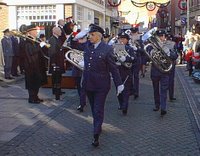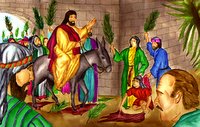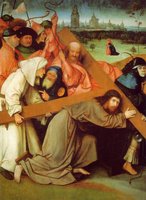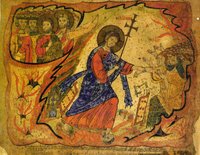Hosannas and Palm Branches
 “Everyone loves a parade.” This old expression indicates that whenever there’s some sort of festivities, all are happy to join in. Of course, “everyone” is an exaggeration. There’s almost always someone who’d rather not join in the fun. In fact, if the parade is organized by people we despise, we’ll go out of our way not to participate.
“Everyone loves a parade.” This old expression indicates that whenever there’s some sort of festivities, all are happy to join in. Of course, “everyone” is an exaggeration. There’s almost always someone who’d rather not join in the fun. In fact, if the parade is organized by people we despise, we’ll go out of our way not to participate.Palm Sunday celebrates such a parade. Jesus’ reputation kept growing throughout His public ministry; when He entered Jerusalem on the donkey, the noise and celebration might make an observer think that finally a parade had come that all could join. No marching bands, no fancy costumes — Jesus was the sole draw. He and his disciples came through the gate with a growing crowd; the sounds of praise attracted more and more people to the celebration. The Son of David, the King of the Jews, was entering God’s city. Coats and palm branches paved the way, people waved their branches to honor this Healer and Teacher of whom they had heard so much.
 “Hosanna (save, we pray)” was the refrain of the songs of praise. It was used at various religious festivals. On Palm Sunday, the people sang it to this traveling Rabbi. Many of them anticipated an end to Roman oppression. They desired for the long-gone days when an anointed king ruled from his throne in Jerusalem. Jesus was their hope that the kingdom would be restored.
“Hosanna (save, we pray)” was the refrain of the songs of praise. It was used at various religious festivals. On Palm Sunday, the people sang it to this traveling Rabbi. Many of them anticipated an end to Roman oppression. They desired for the long-gone days when an anointed king ruled from his throne in Jerusalem. Jesus was their hope that the kingdom would be restored.The leaders of the Jewish people had other ideas. Jesus upset the status quo. He preached against some of their cherished beliefs. He had the potential to lead the common people into rebellion, which would bring the Roman armies down in crushing weight. The parade into Jerusalem made it clear: He had to be stopped. Amazingly enough, that’s just what the Father had in mind! Sinful thoughts were used to carry out His divine will.
The festivities of the Palm Sunday parade are, of course, tempered by knowing its outcome. The King came Jerusalem to claim His kingdom — but not the kingdom everyone thought. As He would tell Pontius Pilate a few days later, “My kingdom is not of this world. (John 18:36)”
Just as His kingdom was different, so were His ascent to the throne and His coronation. Palm Sunday’s hymnody is rich in irony; triumph is tinged with tragedy. One hymn begins: “Ride on, ride on, in majesty! Hark! all the tribes hosanna cry. O Savior meek, pursue Thy road, With palms and scattered garments strowed.” This sounds like the beginning of a huge celebration. But the next four stanzas change course. They anticipate the Passion of the Lord — betrayal and denial, trials and tortures, suffering and death.
 The King climbed to His throne on the ladder of the cross. He went alone, His followers scared to take a stand and running off. His own heavenly Father abandons him. The shouts of praise are replaced by taunts.
The King climbed to His throne on the ladder of the cross. He went alone, His followers scared to take a stand and running off. His own heavenly Father abandons him. The shouts of praise are replaced by taunts.Does everyone still love a parade? This parade? I do. “Ride on, ride on, in majesty! In lowly pomp ride on to die. O Christ, Thy triumphs now begin O’er captive death and conquered sin.” I hate what they did to Jesus. Even more, I hate what I did to Him. But oh, do I love what He did for me.
As disciples and hangers-on deserted Him on His parade to the cross, one thing remained: Sin ... all sin ... your sin and my sin — all the sins of the world were in that procession. God lifted our collective guilt and placed it on His sinless Son. The Christ carried that sin to the cross and accepted the punishment that was our due. He died with our sins so that we might die to them. We claim this death and receive its saving benefits in Baptism; there, we also claim the new life that burst from the tomb on the Third Day.
Use this week to trace again the parade route. Go forth from the palms and hosannas; listen to His final words. Climb with Him to the upper room where He prepares his Supper on Maundy Thursday; then watch with Him as he prays and see him captured. Observe the trial and the crucifixion on Good Friday. But remember, the parade does not end in the tomb. Christ did not stay dead and buried. The route leads through the grave and on to the heavenly realms. And we who believe are free to follow Him the whole distance.
 “Ride on, ride on, in majesty! In lowly pomp ride on to die. Bow Thy meek head to mortal pain, Then take, O Christ, Thy pow’r and reign.” From praise to praise, the parade runs its course. Feeble, flickering earthy honor fades in the light of eternal glory for the Savior of the world. There will be no more hosannas — we’ll have nothing from which to be saved. Instead, we will join in the eternal “Alleluia (praise the Lord)!” — blessing the Lamb who was slain who now lives forevermore.
“Ride on, ride on, in majesty! In lowly pomp ride on to die. Bow Thy meek head to mortal pain, Then take, O Christ, Thy pow’r and reign.” From praise to praise, the parade runs its course. Feeble, flickering earthy honor fades in the light of eternal glory for the Savior of the world. There will be no more hosannas — we’ll have nothing from which to be saved. Instead, we will join in the eternal “Alleluia (praise the Lord)!” — blessing the Lamb who was slain who now lives forevermore.I encourage you to focus with full intent on the loving sacrifice of your Jesus through the coming days. Attend whatever services you can during this Holy Week. Especially, make sure to hear for yourself the wonderful news of the Resurrection during the Easter services. Don’t let the parade pass you by — join in as it leads you home.
Scripture quoted from The Holy Bible, English Standard Version™, © 2001 by Crossway Bibles.
Send email to Ask the Pastor.
Walter Snyder is the pastor of Holy Cross Lutheran Church, Emma, Missouri and coauthor of the book What Do Lutherans Believe.
Technorati Tags: Palm Sunday | Holy Week | Passion | Lent | Easter | resurrection | The Resurrection of Our Lord | worship

1 Comments:
1) How can Jesus' resurrection be on Sunday when all four Gospels say that "He has risen" at dawn on the first day of the week?
2) How could the crucifixtion possibly be on Friday when Jesus himself prophesied in Matthew 12:40 that he would be 3 days and 3 nights in the heart of the earth?
Post a Comment
<< Home